Abstract
The effects of isoprenaline and salbutamol administered orally, by inhalation, or by intravenous infusion were compared in 13 asthmatic patients. Bronchodilator activity was assessed by serial measurement of specific airways conductance (SGaw). Log-dose response curves were obtained for both drugs and showed them to be equipotent as bronchodilators. Cardiovascular effects were variable, but in general, isopenaline caused greater rise in pulse rate and a greater change in blood pressure than the same dose of salbutamol.
Cardiorespiratory measurements during continuous intravenous infusion of increasing doses of both drugs suggested a greater effect of isoprenaline than the same dose of salbutamol on metabolic rate, pulmonary ventilation, pulmonary gas exchange, cardiac output, and heart rate. The effect of salbutamol on the heart rate was about 10 times less than that of isoprenaline but lasted longer.
Full text
PDF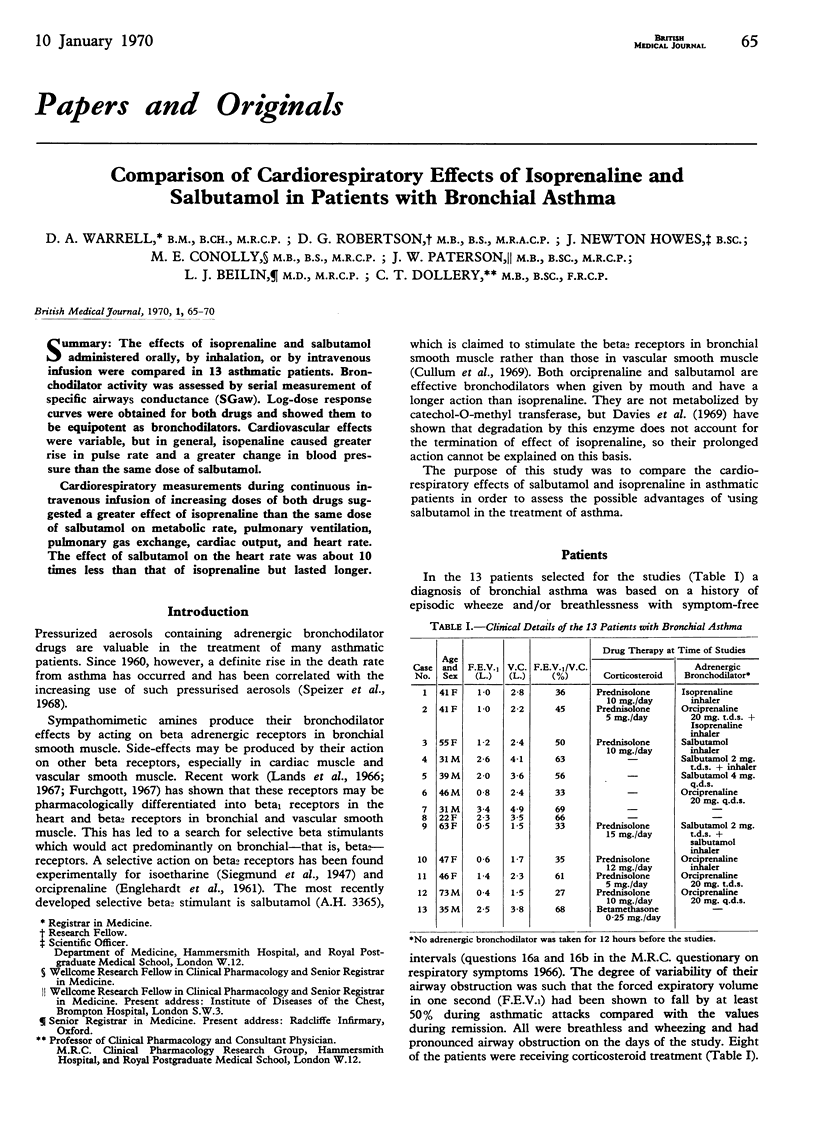
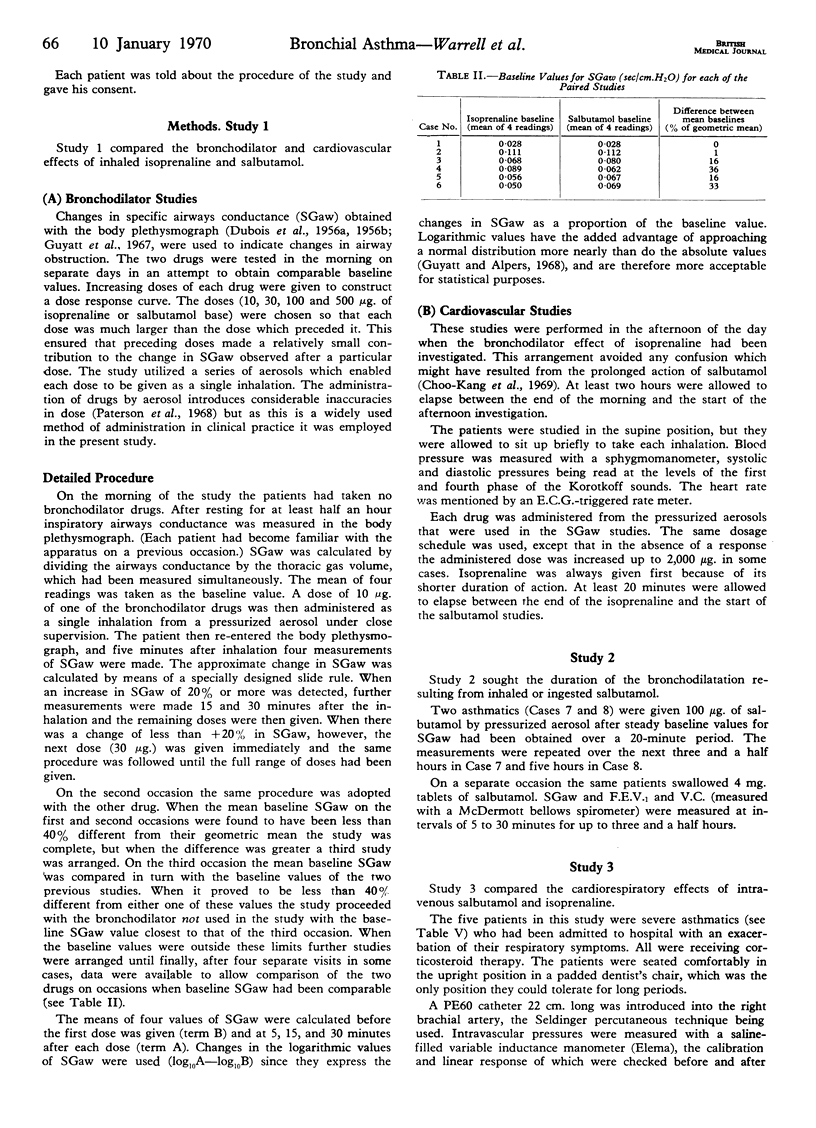
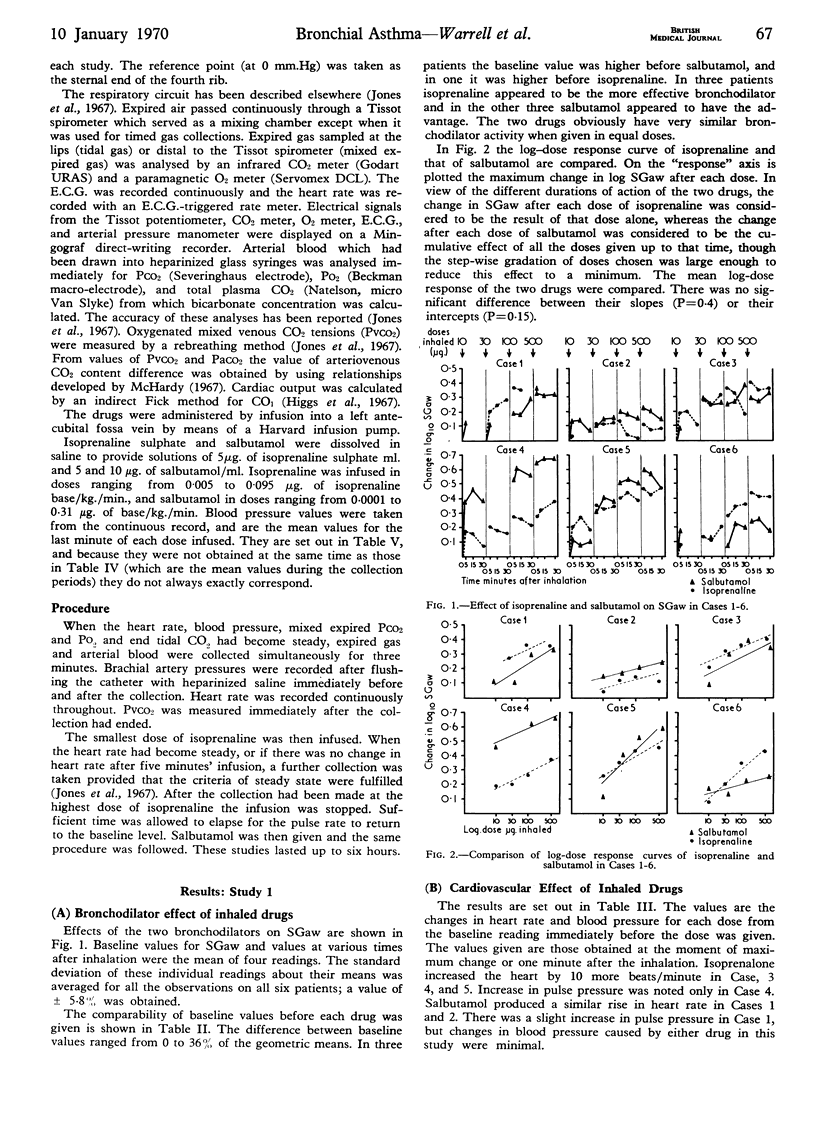
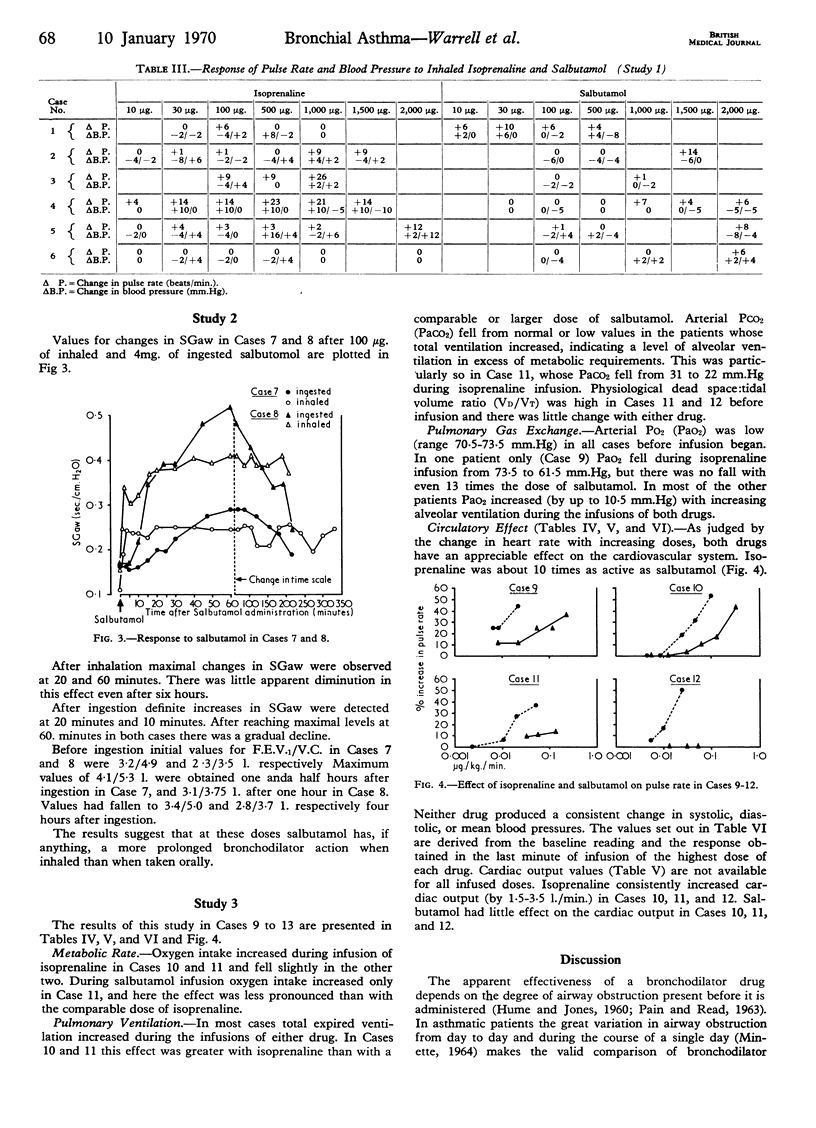
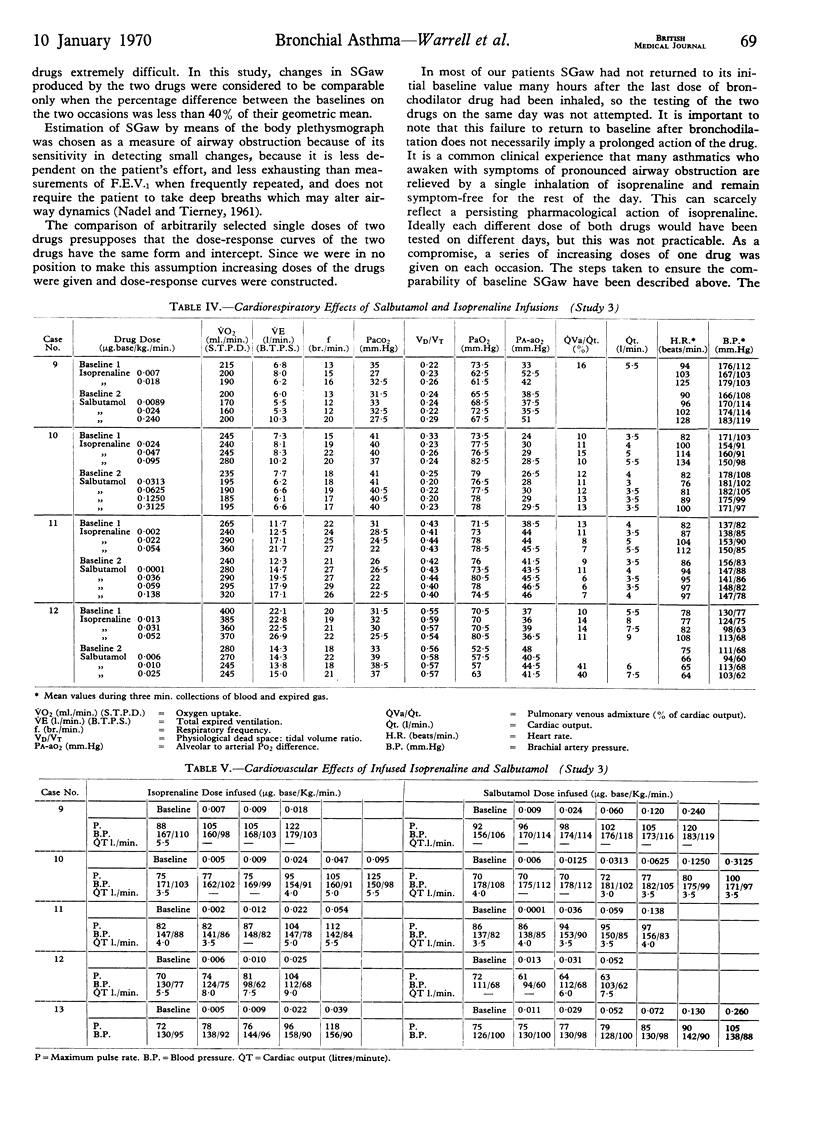
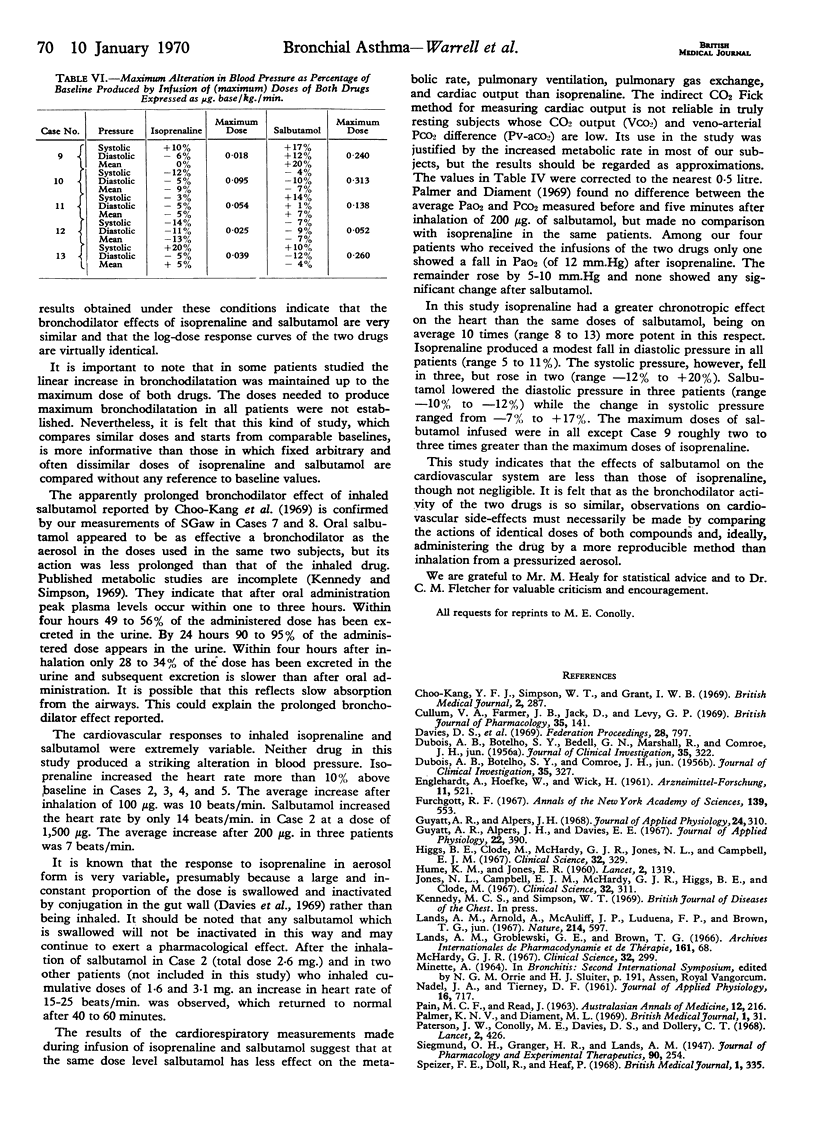
Selected References
These references are in PubMed. This may not be the complete list of references from this article.
- Choo-Kang Y. F., Simpson W. T., Grant I. W. Controlled comparison of the bronchodilator effects of three beta-adrenergic stimulant drugs administered by inhalation to patients with asthma. Br Med J. 1969 May 3;2(5652):287–289. doi: 10.1136/bmj.2.5652.287. [DOI] [PMC free article] [PubMed] [Google Scholar]
- Cullum V. A., Farmer J. B., Jack D., Levy G. P. Salbutamol: a new, selective beta-adrenoceptive receptor stimulant. Br J Pharmacol. 1969 Jan;35(1):141–151. doi: 10.1111/j.1476-5381.1969.tb07975.x. [DOI] [PMC free article] [PubMed] [Google Scholar]
- DUBOIS A. B., BOTELHO S. Y., BEDELL G. N., MARSHALL R., COMROE J. H., Jr A rapid plethysmographic method for measuring thoracic gas volume: a comparison with a nitrogen washout method for measuring functional residual capacity in normal subjects. J Clin Invest. 1956 Mar;35(3):322–326. doi: 10.1172/JCI103281. [DOI] [PMC free article] [PubMed] [Google Scholar]
- DUBOIS A. B., BOTELHO S. Y., COMROE J. H., Jr A new method for measuring airway resistance in man using a body plethysmograph: values in normal subjects and in patients with respiratory disease. J Clin Invest. 1956 Mar;35(3):327–335. doi: 10.1172/JCI103282. [DOI] [PMC free article] [PubMed] [Google Scholar]
- ENGELHARDT A., HOEFKE W., WICK H. [On the pharmacology of the sympathomimetic 1-(3,5-dihydroxyphenyl)-1-hydroxy-2-isopropylaminoethane]. Arzneimittelforschung. 1961 Jun;11:521–525. [PubMed] [Google Scholar]
- Furchgott R. F. The pharmacological differentiation of adrenergic receptors. Ann N Y Acad Sci. 1967 Feb 10;139(3):553–570. doi: 10.1111/j.1749-6632.1967.tb41229.x. [DOI] [PubMed] [Google Scholar]
- Guyatt A. R., Alpers J. H., Davies E. E. Design of body plethysmograph for use in field studies. J Appl Physiol. 1967 Feb;22(2):390–393. doi: 10.1152/jappl.1967.22.2.390. [DOI] [PubMed] [Google Scholar]
- Guyatt A. R., Alpers J. H. Factors affecting airways conductance: a study of 752 working men. J Appl Physiol. 1968 Mar;24(3):310–316. doi: 10.1152/jappl.1968.24.3.310. [DOI] [PubMed] [Google Scholar]
- HUME K. M., JONES E. R. Bronchodilators and corticosteroids in asthma. Forced expiratory volume as an aid to diagnosis and treatment. Lancet. 1960 Dec 17;2(7164):1319–1322. doi: 10.1016/s0140-6736(60)92518-6. [DOI] [PubMed] [Google Scholar]
- Higgs B. E., Clode M., McHardy G. J., Jones N. L., Campbell E. J. Changes in ventilation, gas exchange and circulation during exercise in normal subjects. Clin Sci. 1967 Apr;32(2):329–337. [PubMed] [Google Scholar]
- Jones N. L., Campbell E. J., McHardy G. J., Higgs B. E., Clode M. The estimation of carbon dioxide pressure of mixed venous blood during exercise. Clin Sci. 1967 Apr;32(2):311–327. [PubMed] [Google Scholar]
- Lands A. M., Arnold A., McAuliff J. P., Luduena F. P., Brown T. G., Jr Differentiation of receptor systems activated by sympathomimetic amines. Nature. 1967 May 6;214(5088):597–598. doi: 10.1038/214597a0. [DOI] [PubMed] [Google Scholar]
- Lands A. M., Groblewski G. E., Brown T. G., Jr Comparison of the action of isoproterenol and several related compounds on blood pressure, heart and bronchioles. Arch Int Pharmacodyn Ther. 1966 May;161(1):68–75. [PubMed] [Google Scholar]
- McHardy G. J. The relationship between the differences in pressure and content of carbon dioxide in arterial and venous blood. Clin Sci. 1967 Apr;32(2):299–309. [PubMed] [Google Scholar]
- NADEL J. A., TIERNEY D. F. Effect of a previous deep inspiration on airway resistance in man. J Appl Physiol. 1961 Jul;16:717–719. doi: 10.1152/jappl.1961.16.4.717. [DOI] [PubMed] [Google Scholar]
- PAIN M. C., READ J. PATTERNS OF RESPONSE TO BRONCHODILATOR IN YOUNG PATIENTS WITH ASTHMA. Australas Ann Med. 1963 Aug;12:216–220. doi: 10.1111/imj.1963.12.3.216. [DOI] [PubMed] [Google Scholar]
- Palmer K. N., Diament M. L. Effect of salbutamol on spirometry and blood-gas tensions in bronchial asthma. Br Med J. 1969 Jan 4;1(5635):31–32. doi: 10.1136/bmj.1.5635.31. [DOI] [PMC free article] [PubMed] [Google Scholar]
- Paterson J. W., Conolly M. E., Davies D. S., Dollery C. T. Isoprenaline resistance and the use of pressurised aerosols in asthma. Lancet. 1968 Aug 24;2(7565):426–429. doi: 10.1016/s0140-6736(68)90467-4. [DOI] [PubMed] [Google Scholar]
- Speizer F. E., Doll R., Heaf P. Observations on recent increase in mortality from asthma. Br Med J. 1968 Feb 10;1(5588):335–339. doi: 10.1136/bmj.1.5588.335. [DOI] [PMC free article] [PubMed] [Google Scholar]


